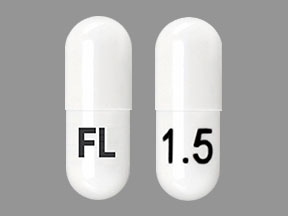Cariprazine Interactions
There are 580 drugs known to interact with cariprazine, along with 13 disease interactions, and 5 alcohol/food interactions. Of the total drug interactions, 103 are major, 474 are moderate, and 3 are minor.
- View all 580 medications that may interact with cariprazine
- View cariprazine alcohol/food interactions (5)
- View cariprazine disease interactions (13)
Most frequently checked interactions
View interaction reports for cariprazine and the medicines listed below.
- Abilify (aripiprazole)
- Adderall (amphetamine / dextroamphetamine)
- Ativan (lorazepam)
- Benadryl (diphenhydramine)
- Co-trimoxazole (sulfamethoxazole / trimethoprim)
- Coenzyme Q10 (ubiquinone)
- Concerta (methylphenidate)
- Copper (copper gluconate)
- Cymbalta (duloxetine)
- Depakote (divalproex sodium)
- Fish Oil (omega-3 polyunsaturated fatty acids)
- Glycerol (glycerin)
- Lamictal (lamotrigine)
- Latuda (lurasidone)
- Lithium Carbonate ER (lithium)
- Lyrica (pregabalin)
- Metoprolol Succinate ER (metoprolol)
- Prozac (fluoxetine)
- Quercetin (bioflavonoids)
- Remeron (mirtazapine)
- Rexulti (brexpiprazole)
- Seroquel (quetiapine)
- Synthroid (levothyroxine)
- Trintellix (vortioxetine)
- Tylenol (acetaminophen)
- Vitamin B12 (cyanocobalamin)
- Vitamin D3 (cholecalciferol)
- Vyvanse (lisdexamfetamine)
- Wellbutrin (bupropion)
- Zoloft (sertraline)
Cariprazine alcohol/food interactions
There are 5 alcohol/food interactions with cariprazine.
Cariprazine disease interactions
There are 13 disease interactions with cariprazine which include:
- suicidality
- dementia
- NMS
- aspiration
- seizure
- hematologic abnormalities
- hyperglycemia/diabetes
- hypotension
- lipid alterations
- renal impairment
- weight gain
- hyperprolactinemia
- tardive dyskinesia
More about cariprazine
- cariprazine consumer information
- Compare alternatives
- Reviews (607)
- Side effects
- Dosage information
- During pregnancy
- Drug class: atypical antipsychotics
- Breastfeeding
- En español
Related treatment guides
Drug Interaction Classification
| Highly clinically significant. Avoid combinations; the risk of the interaction outweighs the benefit. | |
| Moderately clinically significant. Usually avoid combinations; use it only under special circumstances. | |
| Minimally clinically significant. Minimize risk; assess risk and consider an alternative drug, take steps to circumvent the interaction risk and/or institute a monitoring plan. | |
| No interaction information available. |
See also:
Further information
Always consult your healthcare provider to ensure the information displayed on this page applies to your personal circumstances.


